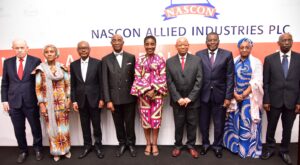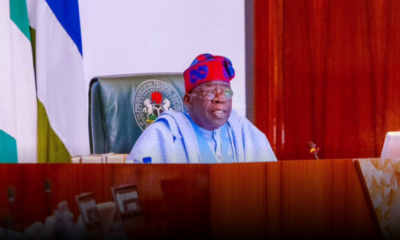- shareholders commend dividend payment.
NASCON Allied Industries Plc have recorded impressive growth in all performance indicators in
the year ended December 31, 2022, with profit after tax surging by 84 percent, from N2.97
billion to N5.47 billion. Shareholders at the company’s 2022 annual general meeting (AGM) held
at the weekend in Lagos commended the board and management of NASCON for consistent
payment of dividends.
Analysis of the food seasoning company’s annual report indicated that profit before tax rose
significantly by 98 percent, from N4.24 billion to N8.37 billion, representing an increase of
N4.12 billion. Turnover was on the upswing, increasing from N33.28 billion to N58.79 billion, a
77 percent increase compared to 2021. Earnings per share also increased to 206 kobo in 2022
in contrast to 112 kobo in 2021. A total of N2.65 billion is to be paid as dividend compared to
N1.06 billion in 2021.
Speaking at the AGM, a shareholder, Mr Tunde Badmus, applauded the management for the
impressive performance and efficient running of the company, amid a harsh economic
environment. Badmus appreciated the company for the dividend declared despite the
challenging operating environment.
Also speaking, Mr Anthony Omojola, the former National-Coordinator, Independent
Shareholders Association of Nigeria lauded the board and management of NASCON for
improved performance and declaration of dividend. Omojola said that the company had
remained consistent in dividend payment over the years.
He, however, urged the company to work with registrars and investors relations department to
tackle the rising unclaimed dividends in the market.
The shareholders at the meeting approved the payment of N1 per 50k share totalling N2.65
billion recommended by the board.
This was in contrast with N1.06 billion or 40k per share declared in the comparative period of
2021. Addressing the shareholders, Mrs. Yemisi Ayeni, the company’s Chairperson, said the company during the period reduced greenhouse gas emissions by five percent.
Ayeni said the company implemented waste reduction programmes and achieved a 28 percent
reduction in hazards and non-hazardous waste generated. “We have strengthened our relationships with our employees, customers, suppliers, and
communities and supported initiatives that promote social well-being," she said.
On the future, Ayeni said that health, safety and environment, and sustainability considerations
remain major drivers of policy and strategy at NASCON.”
Although global and national pressures continue to pose challenges, we are optimistic about
the future outlook as we continue to monitor the business environment.
" Despite the identified challenges, the board and management of NASCON are determined to continue on the right path to develop the business," Ayeni said.
The Acting Managing Director, Mr. Thabo Mabe, said insecurity, congested ports and poor road
infrastructure, unstable power supply along with employee emigration, traffic gridlock and
foreign exchange issues contributed to the challenges of doing business in 2022.
Mabe expressed optimism that “2023 will involve capitalisation on our gains, leading to greater productive efficiency and enhanced resource utilisation in spite of the challenges in 2022.”
Speaking on future plans, he said that the company would continue to embrace strategies that
would boost its market share. “Our core competence in our business is to refine crude salt for both human and animal consumption. This is an area that we have focused our business to attain leading customer service standards. Our plan for future growth is to continue to develop these markets and drive cost savings within the business, as input costs skyrockets. Nigeria is blessed with a huge consumer base and opportunities; we will be part of these opportunities and contribute our quota to power eradication” he said.
National Salt Company of Nigeria was established as a salt refinery at Ijoko, Ogun State in 1973,
as a joint venture between the Federal Military Government of Nigeria and Atlantic Salt &
Chemical Inc. of Los Angeles, California, USA.
The Company was privatised in 1991 with its shares listed on the Nigerian Stock Exchange in
October 1992, through which Dangote Industries Limited purchased majority shares. Following
the reverse takeover of NASCON by Dangote Salt Limited (DSL) in 2007, NASCON acquired the
assets, liabilities, and business undertakings of DSL.
Principal activities of the company include processing raw salt into refined, edible, and
industrial salt. NASCON is also into the production of seasoning and vegetable oil.




 BIG STORY3 days ago
BIG STORY3 days ago
 BIG STORY4 days ago
BIG STORY4 days ago
 BIG STORY3 days ago
BIG STORY3 days ago
 BIG STORY4 days ago
BIG STORY4 days ago
 BIG STORY4 days ago
BIG STORY4 days ago
 BIG STORY2 days ago
BIG STORY2 days ago
 BIG STORY1 day ago
BIG STORY1 day ago
 BIG STORY12 hours ago
BIG STORY12 hours ago

























